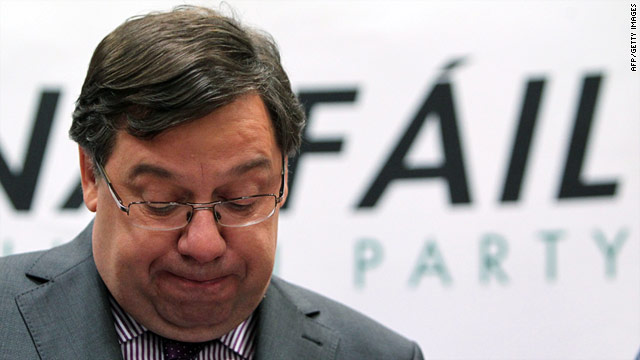Scammer
Banned

-- Irish Prime Minister Brian Cowen won a vote of confidence Tuesday from members of his party who determined he should lead them into the next election.
"The party are united behind Brian Cowen as leader and we move forward both in terms of the continuation of the work with a national recovery plan and our preparations for a general election," said John Curran, a party spokesman.
Cowen had announced Sunday that he was putting himself up for a confidence vote in the face of widespread Irish anger at his decision to seek an international financial bailout. He said he wanted to keep his post and seek re-election.
Finance Minister Brian Lenihan announced Tuesday he would support Cowen, a key boost after Foreign Affairs Minister Micheal Martin said Sunday he would not.
Cowen is "the only person to lead Fianna Fail into the election," Lenihan told Irish state broadcaster RTE.
Martin tendered his resignation before the vote, and Cowen -- who did not accept the offer at the time -- accepted it after the vote. Martin had held the post since 2008.
"I fully respect the decision of my colleagues and I am very encouraged by the general spirit of the conversations," Martin said in a statement. "There is no doubt that we now have a renewed sense of energy and commitment to bringing our message to the people. We go into this election as a united party behind our leader."
Cowen had consulted with his Fianna Fail party colleagues, then said at a news conference, "I've come to the conclusion that I should continue to lead the party," adding that he believed the decision is in the best interests of the country and "not motivated by personal ambition."
Ireland's next elections are due to take place over the next few months.
Cowen has become a lightning rod of controversy, largely for his leadership in the economic crisis the country is facing.
Ireland accepted an 85 billion euro (U.S. $113 billion) bailout package last month from the European Union, International Monetary Fund and individual European nations.
Cowen requested the loan in November after days of insisting Ireland did not need help.
The goal of the aid, the Fianna Fail party said, was to return the nation's economy to sustainable growth and restore the health of its banking system.
A related four-year government austerity plan achieves savings through welfare cuts worth 10 billion euros ($13.2 billion) and higher taxes, expected to bring in 5 billion ($6.6 billion).
Ireland also unveiled a tough new budget, changing the income tax system, raising taxes on gasoline and diesel fuel and reducing benefits for parents.
Dublin is cutting 6 billion euros (nearly $8 billion) from its budget as it tries to claw its way out of massive debt.
